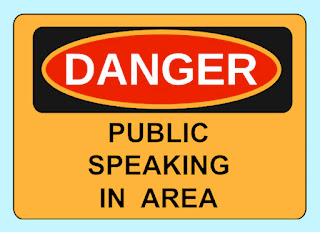From the Mayo Clinic, "How can I overcome my fear of public speaking?," by Daniel K. Hall-Flavin, M.D.
Fear of public speaking is a common phobia. It can range from slight nervousness to paralyzing fear and panic. Many people with a fear of public speaking avoid public speaking situations altogether, or they suffer through them with shaking hands and a quavering voice. But with preparation and persistence, you can overcome your fear.
These steps can help:
Know your topic. The better you understand what you're talking about, the less likely you'll make a mistake or get off track. And if you do get lost, you'll be able to recover quickly. Take some time to consider what questions the audience may ask and have your responses ready.
Get organized. Have the information you want to present carefully planned out ahead of time, including any props, audio or visual aids you'll use. The more organized you are, the less nervous you'll be. Use an outline on a small card to keep yourself on track.
Practice, and then practice some more. Practice your complete presentation several times. Do it for a few people you're comfortable with. Ask them to provide you with feedback. Or, record it with a video camera and watch it yourself so you can see opportunities for improvement.

Do some deep breathing. This can be very calming. Take two or more deep, slow breaths before you get up to the podium and during your speech.
Focus on your material, not on your audience. People are primarily paying attention to the information you're presenting — not how you're getting it across. Chances are they won't even notice your mistakes or nervousness. If audience members do notice you're nervous or that you get a little off track, they won't judge you. They're rooting for you and want your presentation to be a success.
Don't be afraid of a moment of silence. If you lose track of what you're saying or you begin to feel nervous and your mind goes blank, it can seem like you've stopped talking for an eternity. But in reality, it has probably only been a few seconds. Even if it's longer, it's likely your audience won't mind a pause to consider what you've been saying. This might be a good time to take a few slow, deep breaths.

Recognize your success. After your speech or presentation, give yourself a pat on the back. It may not have been perfect, but chances are you're far more critical of yourself than your audience is. Everyone makes mistakes during speeches or presentations. Look at any mistakes you made as an opportunity to improve your skills.
Get support. Join a group that offers support for people who have difficulty with public speaking. One effective resource is Toastmasters, a nonprofit organization with local chapters that focuses on training people in speaking and leadership skills. (source: The Mayo Clinic)

No comments:
Post a Comment